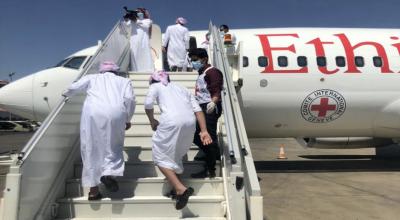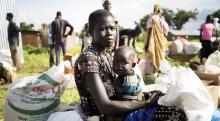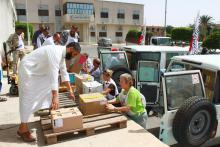Basic international humanitarian law (IHL) rules applicable to this situation:
Civilians and persons hors de combat must be treated humanely.
Prisoners of war must be released and repatriated without delay once active hostilities cease.
Civilian internees must be released as soon as the reasons for internment no longer exist, and as soon as possible after active hostilities cease.
Persons detained in connection with a non-international armed conflict must be released as soon as the reasons for detaining them cease to exist. Detainees may continue to be held if penal proceedings are pending against them or if they are serving a sentence lawfully imposed.
The case in brief
Yemen has been ravaged by armed conflict since 2014. Since 2015, a military coalition led by Saudi Arabia has led attacks against the Houthis, a non-state armed group, in support of the Yemeni government. Fighting has persisted between government forces and other armed groups as well as among armed groups in other parts of the country. The United Nations (UN) continues efforts to broker peace between the parties. Meanwhile, people continue to be detained or interned in relation to the fighting.
In accordance with a UN-brokered agreement signed by the Yemeni parties and the Arab Coalition representative in 2018 aimed at building mutual trust, both parties have released hundreds of detainees in compliance with IHL. The parties to the agreement may have been influenced by one or more of the following: diplomatic efforts; international pressure; the desire to demonstrate credibility and improve their public image.
IHL compliance highlights
- In December 2018, the Yemeni parties and the Arab Coalition Representative signed an agreement to carry out a “comprehensive and complete exchange of all prisoners, detainees, missing persons, arbitrarily detained and forcibly disappeared persons, and those under house arrest” through an exchange process facilitated by the UN and the ICRC.
- In 2019, the parties to the agreement began to honour their commitment: the Houthi National Committee for Prisoners’ Affairs released 290 detainees, while the Saudi-led coalition released 128 detainees.
Case prepared by Tawny Brar, Patrick Calvo, Jenna Corcoran, Paola Maymí, Austin McCarthy, George Mixon, and Nathalie Kalombo, J.D. students at Emory University School of Law, under the supervision of Professor Laurie Blank, Emory University School of Law.
A. AGREEMENT BETWEEN THE YEMENI PARTIES HAS BEEN REACHED FOR THE EXCHANGE OF PRISONERS
[Source: Office of the Special Envoy of The Secretary-General for Yemen, Agreement for The Exchange Prisoners, Detainees, Missing Persons, Arbitrarily Detained And Forcibly Disappeared Persons, And Those Under House Arrest, 17 December 2018, available at https://osesgy.unmissions.org/agreement-exchange-prisoners-detainees-missing-persons-arbitrarily-detained-and-forcibly-disappeared]
Preamble:
This is a humanitarian issue and it shall not be subject to any political scores or other matters and the perspective of parties shall be to reunite the bereaved families, as it is endorsed in Islam.
Recognizing the importance of urgently addressing the issue in accordance with the legal processes and provisions, particularly, the conventions, principles and norms of international humanitarian law, human rights and relevant laws of the Republic of Yemen and relevant United Nations resolutions,
This agreement was executed under the auspices and the supervision of the Office of the Special Envoy of the Secretary-General for Yemen, the sponsor and guarantor for this agreement. The International Committee of the Red Cross shall also oversee and facilitate the exchange process and the technical procedures related to this agreement.
[…] Therefore, the safety of the staff of the International Committee of the Red Cross shall be ensured during this process and all necessary facilities shall be provided to them so that the International Committee of the Red Cross can play its intermediary and neutral role to facilitate the implementation of the agreement.
To demonstrate goodwill and to promote the peace process, the Yemeni parties and the Arab Coalition Representative (hereinafter referred to as the "Parties") agreed to conduct a comprehensive and complete exchange of all prisoners, detainees, missing persons, arbitrarily detained and forcibly disappeared persons, and those under house arrest, in accordance with the following principles:
[…]
Implementation Mechanism:
Each Party shall hand over to the other Party the lists of their prisoners, detainees, kidnapped persons, or any person arrested in relation to the events, within one week from the date of signature of this agreement. All lists shall be exchanged through the Office of the Special Envoy of the Secretary-General for Yemen.
The final lists shall be signed by all parties and handed over to the Office of the Special Envoy of the Secretary-General for Yemen and the International Committee of the Red Cross, for the purpose of preparing and conducting the exchange process in coordination with the Office of the Special Envoy of the Secretary-General for Yemen.
[…]
A committee from the two parties shall be formed and it shall commence its task upon signing this agreement, to recover and exchange bodies from all fronts and areas and the two parties shall facilitate the work of the committee, secure it, and cooperate with it.
[…]
B. NEARLY 300 DETAINEES HAVE BEEN RELEASED BY HOUTHI FORCES
[Source: Deutsche Welle, Houthi Rebels Release Hundreds of Detainees in Yemen, 30 September 2019, available at https://www.dw.com/en/houthi-rebels-release-hundreds-of-detainees-in-yemen/a-50647201]
Yemeni Houthi rebels on Monday released at least 290 detainees from a prison in the capital, Sanaa, as part of a UN-brokered prisoner exchange agreement between the rebels and Yemen's Saudi-backed government.
In December 2018, the Iran-backed Houthis agreed with the Yemeni government to swap prisoners as a confidence-building step. Each side agreed to release at least 7,000 prisoners, but implementation has stalled.
Many of the prisoners were taken in raids that the rebels have carried out since 2014, when they overran Sanaa, and much of northern Yemen, pushing Yemen's government out.
[…] The Houthis said on Monday that they had freed 350 detainees from Sanaa's Central Prison, adding that those released were on a list that had been prepared for the UN deal.
The Red Cross said it had facilitated the release of 290 prisoners; however, more could have been freed without the aid group's involvement, according to The Associated Press.
A Houthi official in charge of prisoners' affairs told reporters in front of the prison that the move "proved" the rebels' credibility in implementing the agreement reached in Sweden in late 2018, calling on the Saudi-led coalition to "take a comparable step."
The UN's special envoy for Yemen, Martin Griffiths, welcomed the unilateral release of the detainees, adding he hoped the move would "lead to further initiatives that will facilitate the exchange of all the conflict-related detainees as per the Stockholm Agreement."
[…]
C. HOUTHIS ANNOUCE THE RELEASE OF PRISONERS
[Source: Houthis announce release of hundreds of prisoners, Al Jazeera, 30 September 2019, available at https://www.aljazeera.com/news/2019/09/houthis-announce-release-350-prisoners-almasirah-tv-190930083854096.html]
[…] A statement by the Houthi National Committee for Prisoners' Affairs (NCPA) carried by Al Masirah TV said the individuals were on the list of persons drawn up as part of the prisoner exchange deal agreed in Stockholm in December.
"Our initiative proves our credibility in implementing the Sweden agreement and we call on the other party to take a comparable step," said Abdul Qader al-Murtada, head of the NCPA, in the statement carried by the Houthi-run broadcaster.
"We decided to release 350 prisoners because nothing from Sweden agreement have been achieved. The release is going take place today," the NCPA statement read.
The Houthis said the release of the prisoners was a gesture of goodwill to the Saudi-UAE-led coalition, which has carried out the bombing in support of the internationally recognised government of Abd-Rabbu Mansur Hadi since 2015.
[…]
He urged the UN to pressure the government to take a similar step.
[…]
The Houthis recently announced the capture of hundreds of Yemeni loyalist forces in a late August offensive near the Saudi border, but they were not among those released on Monday.
On Monday, Yemeni Information Minister Muammar al-Iryani accused Houthi rebels of claiming a "fake victory" to cover up their political dilemma.
D. SAUDI COALITION RELEASES HOUTHI DETAINEES AS PART OF EXCHANGE
[Source: Houthi prisoners released by Saudi arrive in Yemeni capital, Reuters 28 November 2019, available at https://www.reuters.com/article/us-yemen-security-prisoners/houthi-prisoners-released-by-saudi-arrive-in-yemeni-capital-idUSKBN1Y217P]
A group of Houthi prisoners released by Saudi Arabia arrived in the Yemeni capital Sanaa on Thursday, Reuters witnesses said, in a step that may encourage efforts to end a nearly five-year war in the country.
The detainees are from the Iran-aligned movement that a Saudi-led military coalition has been fighting since March 2015, after the Houthis ousted the internationally recognized government in Sanaa.
The International Committee of the Red Cross (ICRC), which transported the detainees from Saudi Arabia to Yemen, said 128 people were being repatriated. On Tuesday, the coalition said it had released 200 prisoners. The reason for the difference in numbers was not immediately clear.
Reuters witnesses saw two ICRC planes carrying the detainees arrive at Sanaa airport.
“The ICRC sees the release as a positive step and hopes that it will spur further releases and repatriations of conflict-related detainees,” the aid agency said in a statement. It said it had acted as a neutral intermediary and was not involved in any of the talks that preceded the release.
Riyadh has been holding informal talks with the Houthis since late September about a ceasefire, sources have said, as it seeks to exit an unpopular war after its main coalition partner the United Arab Emirates withdrew troops.
[…]
Discussion
I. Classification of the Situation and Applicable Law
1. How would you classify the situation in Yemen? Is there an armed conflict? What additional information would you require in order to make such a determination? (GC I, Art. 3; AP II, Art. 1)
II. Release of Detainees in Armed Conflicts
2. What are the main protections of persons deprived of their liberty in armed conflicts? Are these the same in international armed conflicts and non-international armed conflicts? (GC I, Art. 2; GC I, Art. 3; AP II, Art. 1; GC IV, Art. 32; GC IV, Art. 76, CIHL, Rule 87)
3. When shall the persons deprived of their liberty in armed conflict be released? Are there rules governing when and how they are released? (GC III, Art. 3; AP II, Art. 4; AP II, Art. 5;CIHL, Rule 128)
III. Elements Contributing to Respect for IHL
4. (Document A) What impact do you think the Stockholm Agreement had on the Houthis’ decision to release detainees? Do you think that the diplomatic relations and international pressure have influenced the parties to the conflict to respect IHL?
5. (Document A) Could religion have played a role behind the decision of release of detainees by the parties to the conflict as mentioned in the preamble of the Stockholm Agreement?
6. (Documents A and B) What was the role of the UN Office of the Special Envoy for Yemen in facilitating the implementation of the agreement for the release and exchange of detainees? What are the benefits of having the ICRC as an intermediary to facilitate the exchange?
7. (Document C) Could the political pressure made publicly by the Houthis representatives when calling off the Saudi-Arabia led coalition had an impact in the latter’s actions?
8. (Document C) Based on the following statement made by Houthis representatives: “Our initiative proves our credibility in implementing the Sweden agreement and we call on the other party to take a comparable step," do you think the act of respect could have been triggered by the will to gain legitimacy and good publicity in the public opinion? Could it have been a way to “cover up political dilemma[s]” as suggested by the Yemeni Minister?
9. (Documents B, C and D) Do you think the Saudi Arabia led coalition released Houthis detainees as example of positive reciprocity?






